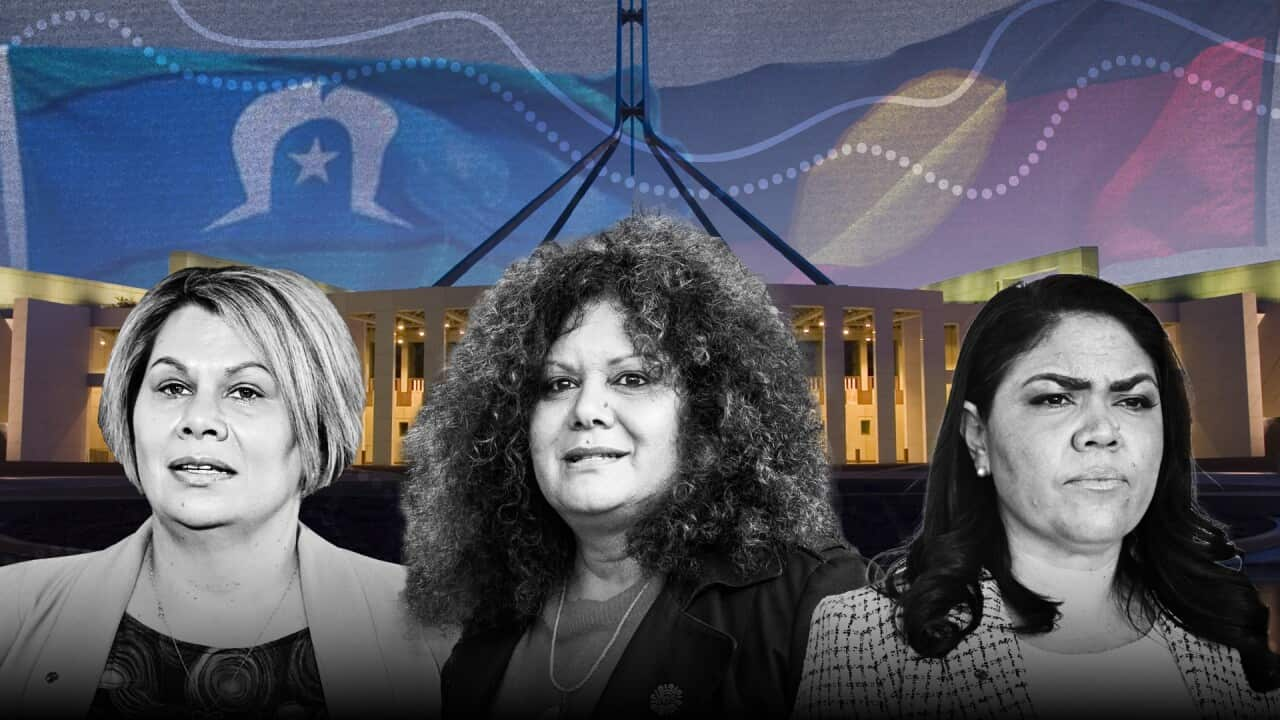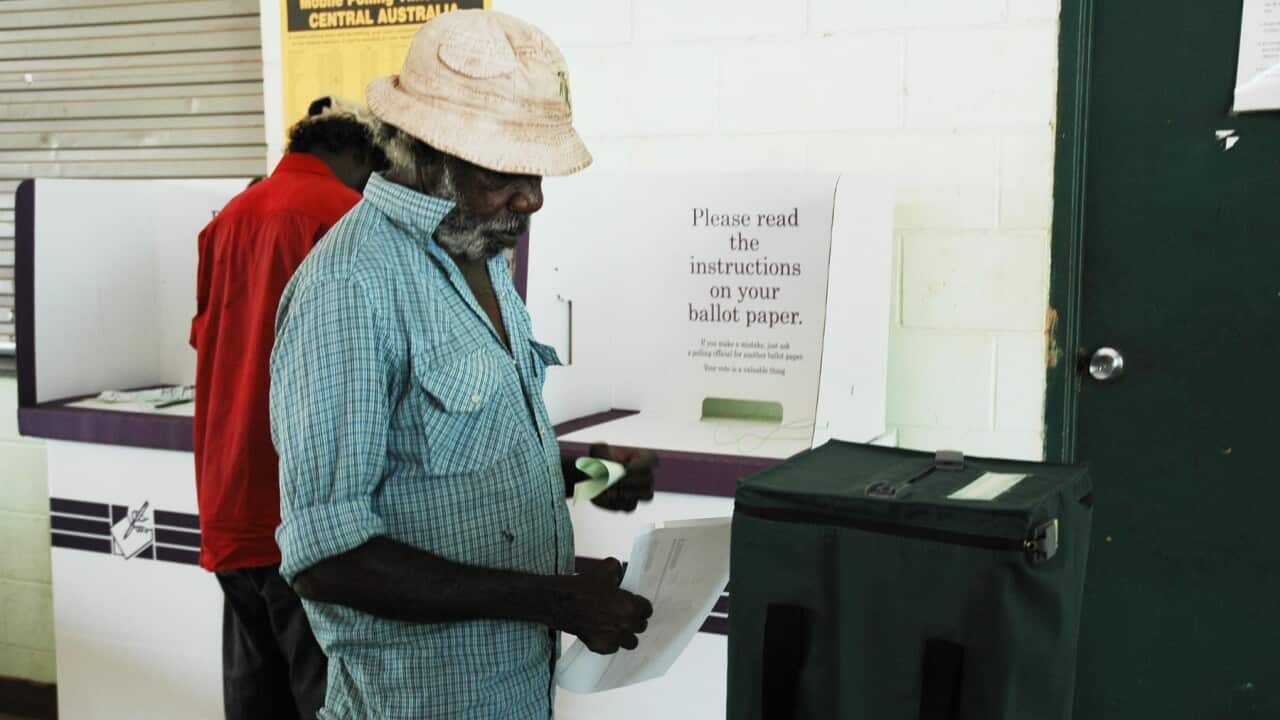Uncle Matthew Leeder, a Dja Dja Wurrung and Mimegin man from NSW (Biripi Country), is an active member of several social media groups dedicated to Aboriginal cultures.
Ahead of the election, he claims the major political parties have discussed migration “like this land was empty to begin with”.

Matthew Leeder is a Dja Dja Wurrung and Mimegin man, who is a chef by occupation. Credit: Supplied by Matthew Leeder
“Before they decide who else comes here, they need to deal properly with us first — truth, treaty, justice. Without that, it’s just more people building on top of an unfinished foundation.”
What are the major parties saying about migration?
During the election campaign, migration has taken centre stage with both major parties announcing key policies.
Peter Dutton has promised that the Coalition government would cut permanent migration by 25 per cent, reduce net overseas migration by 100,000 places, and put caps on international students coming to Australia.
Labor, too, has stated that it would continue reducing migration and return the number of international students to pre-pandemic levels.
Despite political parties announcing migration policies, some First Nations people claim that they are not taken into consideration when decisions are made.
According to the Australian Electoral Commission, more than 18 million Australians are eligible to vote in the federal election. Of these,.
As of 30 June 2021, Australia’s was 983,700. It is projected to reach between 1.17 million and 1.19 million people by 2031, according to the Australian Bureau of Statistics.
This week, , after suggesting a referendum on the proposal could pass in the future.
The proposal for an advisory body was defeated in a 2023 public vote.
“We (Indigenous Australians) are talked about when it suits them, but our voices aren’t leading the conversation. Our struggles and our strengths get twisted to fit political games," Leeder said.
For him, true representation would mean Indigenous people setting the agenda.
“Until we have real power in decision-making, not just token seats, we won’t be fairly represented.”
He clarified that the Indigenous way of life is multicultural, and he and others aren't against the exchange of cultures.
"You can’t celebrate other cultures while letting the First Peoples’ cultures be pushed aside. Our languages, our stories, our law — that’s the heart of this land. Without us, Australia has no real identity.
“We’re all for people having a good life — that’s our way too — but we’re tired of being invisible in our own country.”
Diversity is important, but it can’t come at the cost of the oldest cultures on Earth.Matthew Leeder, a Dja Dja Wurrung and Mimegin man
“You can’t celebrate other cultures while letting the First Peoples’ cultures be pushed aside.”
A section of First Nations people — and their allies — have expressed support for educating new Australian citizens about Aboriginal and Torres Strait Islander peoples, culture and history.
'Educate migrants about First Nations people'
Asha Bhat considers herself an ally to Aboriginal and Torres Strait Islander people in Australia.
A migrant from India, she is the CEO of Southern Aboriginal Corporation.

Asha Bhat, CEO of Southern Aboriginal Corporation. Credit: Supplied by Asha Bhatt
“The current debate (on migration policies) lacks nuance. It tends to focus on numbers and economics rather than the values of compassion, inclusion, and responsibility.”
Bhat said that any political framework in Australia, including migration, should begin with genuine recognition of Indigenous sovereignty.
The cultural, economic and social impacts of migration policies on Indigenous people are not getting due attention, she argues.
Migration policy is not just about attracting skilled migrants. It should be invested in a cultural program to ensure that new Australians are educated about the First Nations’ history and rights.Asha Bhat, CEO of Southern Aboriginal Corporation
“When I came to Australia, I did not know much about the First Nations’ people. Now, when I meet new Australians, I ensure that they are educated in this aspect.”
There can only be concerns when multiculturalism is celebrated without first acknowledging and respecting Indigenous cultures.
“Aboriginal Australians feel that their voices are either not heard or sidelined in discussions about diversity. Multiculturalism should be built on a strong foundation of Indigenous recognition.”
'Mandatory education' to boost awareness
Blak Douglas, a classically trained didgeridoo player from Blacktown, NSW (Bungarrabee), was born to an Aboriginal father and a Caucasian Australian mother.
He claims that it was easier for him to grow up in society than his "darker-skinned cousins".

Blak Douglas was born Adam Douglas Hill to a Dhungatti father and a Caucasian mother and carries English, German, Irish and Scottish ancestry. Credit: Ben Pearse (2022), supplied by Blak Douglas
It is ironic that consistent federal governments can accept people onto this continent who might not even understand the diversity of Aboriginal culture on their arrival.Blak Douglas, Indigenous artist
"Having been a witness to many citizenship ceremonies in Australia, I know that people don't really receive information that highlights the fact that we have such diversity of Aboriginal culture under the Commonwealth fabric of Australia."
He argues that migrants should receive "mandatory education" about First Nations' history and culture to ensure better inclusion.
This could be part of the visa application process or imparted upon arrival here.
"There is always going to be a bipartisan standpoint on visitation to this continent; which has sadly been overlooked for a long time now, with respect to the First Nations people of this land," he said.
According to Douglas, many Aboriginals feel that they are not part of the Commonwealth of Australia and believe they should be given sovereign rights.
📢 For news, information, and interviews in Punjabi from Australia and the homeland, tune into SBS Punjabi live, Monday to Friday at 4 pm, on, digital radio (channel 305 on your television) or via the .






